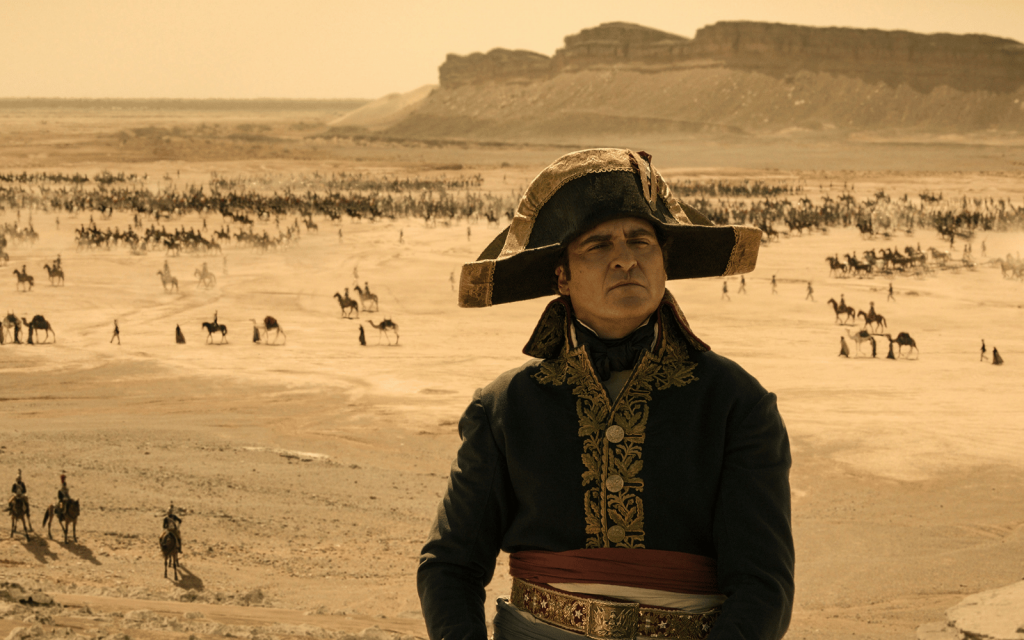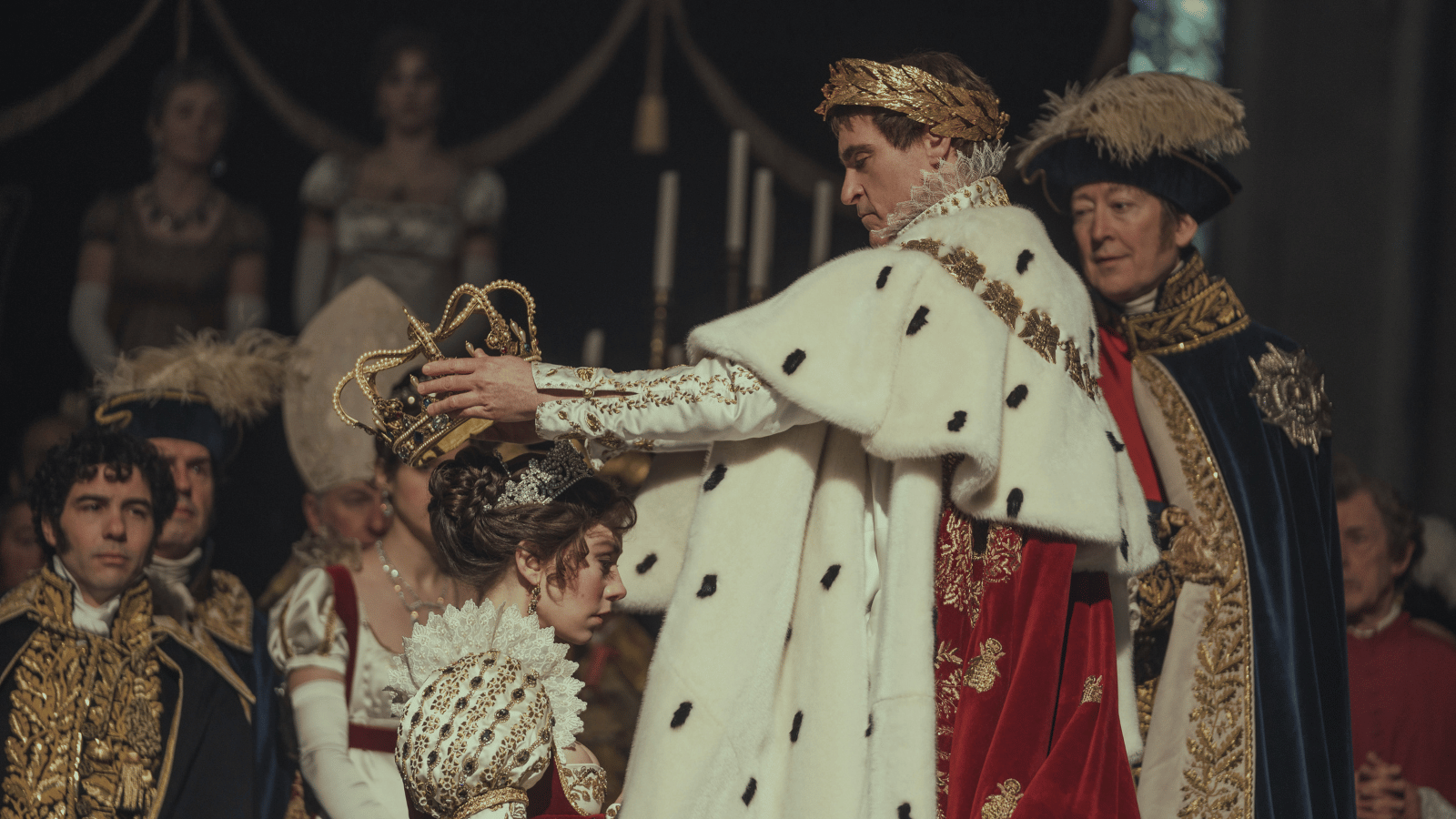Napoleon’s biggest sin wasn’t the countless people he slaughtered in his rise to the top, the endless adultering, or his megalomaniacal ego. It was the fact that Ridley Scott had the gall to put him up on the big screen for all of two hours and thirty-eight minutes. Scott’s ‘Napoleon’ epic, which Stuff got to see ahead of the film’s Friday 24 November release, left us wishing we’d have stayed in and watched Oppenheimer again instead. Hell, we probably could have laboured through another showing of The Whale.
On paper, Ridley Scott’s grand vision for a biopic centred on a figure so steeped in history should work. And on some levels, it does. All the usual Ridley gimmes shine through – excellent cinematography and a world that feels real, even lived in – always a bonus for a story that’s loosely based on historical events. Pacing is really where Napoleon falls hardest, attempting to deliver far too much in a single sitting, eventually devolving into a contorted mess that somehow manages to make the Little Corporal, well, uninteresting.
France, War, Joséphine
Napoleon isn’t an especially complex film to follow, despite the titular figure’s modern-day insinuation – even if Scott’s pretension and glaringly odd pacing decisions make it seem that way. Napoleon, played by the usually exquisite Joaquin Phoenix, occupies most of the runtime as he rises through the French ranks, conquering everything and everyone in his path. Joaquin’s performance, while apt, is often outshone by Vanessa Kirby’s wonderful portrayal of Joséphine de Beauharnais, Napoleon’s wife.
The key to ‘getting’ Napoleon lies in the lens through which you view it. Scott has, for the most part, impressed us here – splitting the film’s narrative into three, easily digestible focuses that help us humanise and relate to the man behind the name. These also happen to be the real Napoleon’s final words: France, Army, Joséphine. We think. We weren’t there. And neither was Ridley Scott, evidently.
Perhaps unsurprisingly for a Napoleon biopic, things kick off in France. Marie Antoinette is beheaded and buried, all within the film’s first five minutes. It’s a rather austere and gruesome scene that sets the tone we were expecting and looking forward to. Not long after, we’re introduced to Napoleon – a Corsican artillery commander, who is ordered to take back the port of Toulon, currently occupied by the British. Scott wastes absolutely no time in giving the audience its first taste of blood, and what a taste it was.
Still, it’s a rather jumpy first ten or so minutes that’s finally given some room to breathe when the fighting breaks out because the scene is longer than it takes a character to spout some exposition. Napoleon retains that pattern for the rest of the film, and it’s here that the movie makes itself most plain. This isn’t a deep dive into the man that was Napoleon. It’s a perfunctory attempt to showcase Napoleon’s relationships with France, war, and his first wife Joséphine and an excuse for Scott to flex his cinematic muscles.
Telling instead of showing
Have we mentioned that this is two and a half hours long? Apparently, yes. Its runtime is… noticeable. From the word go, Ridley Scott wastes no time in covering as much about Napoleon’s life as possible. As unfeasible as it is to cover the real man’s 61 battles in less time than something from James Cameron’s repertoire, Scott certainly tried.
To that end, the audience is only ever shown a few of Napoleon’s most well-known exploits, with a deeper focus put on the most famous battles – Toulon, Austerlitz, Borodino, and Waterloo – with only a brief promise of battle beside the Pyramids of Egypt. Others are either shrugged off entirely or cast aside in a single line of dialogue, like Napoleon’s apparently conflict-less conquering of Italy. Often, it’s the clumsy and cluttered script – penned by David Scarpa of The Day the Earth Stood Still ‘fame’ – that drags the already weak pacing down further.
And, unfortunately, that deeper focus on only a few battles doesn’t leave much room for anything else. Less attention is paid to Napoleon’s inner torment, with scenes beginning and ending rather abruptly, once the director has got the essential out of his actors. Scott is seemingly infatuated with what comes next, jumping forward in time like it’s Back to the Future II, hardly ever sparing a thought for any potential weight a scene might have had.
Feelings of guilt, elation, and anger take a backseat in Napoleon. And we wish it weren’t so.
The audience isn’t denied one emotion of Napoleon’s character: love. That’s not because we can physically see Napoleon’s infatuation with his first wife Joséphine, but because Scott and Scarpa attempt to hit the audience in the head over and over with the same, tired narrative device – voice-over narration. Much of the film’s love sub-plot is told through letters between the two as he travels the world, with only the occasional return to human emotion whenever Napoleon is feeling fathersome (he’s a horndog).
That isn’t to say we didn’t like those scenes. They’re bolstered by the immense performance of Vanessa Kirby, who serves as the film’s next main character and Napoleon’s only source of comfort throughout. It’s easily one of the more important aspects of the film and shines as a sliver of light at the end of the tunnel. A light that ultimately never shone brighter.
Eager for the battle
When Scott does leave the camera on for more than a couple of minutes before another janky fast-forward, Napoleon is at its best. We glimpse the titular character’s battle-driven mind as he plans and defeats his enemies, with some of the best action sequences we’ve seen in some time. While the rest of Napoleon’s life is condemned to poor direction and awkward writing, those battles we mentioned are devoid of any such issues. Thank God.
That’s partly helped by Scott’s love of gore which is evident from the get-go, with blood-soaked uniforms and cannonballs through horses’ chests being the least of the fun. What really makes those battles stand out, however, is the clever and brilliant cinematography.
You might hear that Napoleon is funny. And it is. Occasionally. David Scarpa did manage to elicit a chuckle or two out of us amongst some of the cringe-worthy lines, but our early-screening theatre was as quiet as a pair of particularly boring rocks. It’s not the main attraction but some semblance of humour can be found if that’s your thing.
Performance enhancing performances
Arguably, the key facet to making a movie like Napoleon work is the performances from the not-so-star-studded cast, with the two standouts being the titular Napoleon Bonaparte played by Joaquin Phoenix and Joséphine de Beauharnais played by Vanessa Kirby.
You’ll likely find junkets holding Phoenix’s performance in high esteem, but not here. There can be no doubt that Phoenix was good, as always, but for a figure as important as this, he hardly ever digs deeper into the character, preferring to maintain a steelier approach, internalizing the character’s thoughts – apart from the regularly crammed love letters that offer us the only insight into the recesses of his mind.
It’s difficult to blame Phoenix for this, as it’s Scott’s continually odd decisions to cut and move the story along at a rapid pace that never leaves enough room for Phoenix to take over a scene like he would anywhere else. It also prevents Phoenix from ever reacting – a skill that’s just as important as acting itself. We’re praying that it’s an issue that’ll be resolved in the three-and-a-half-hour director’s cut of Napoleon when it eventually arrives on Apple TV+.
The only other performance of substance came from Kirby, filling the shoes of Napoleon’s wife. Whatever misgivings we might have had surrounding Phoenix’s mark on the film are countered by Kirby in any scene she appears. She’s the most lively and convincingly real character in the film, something that’s sure to net the actor bigger roles later down the line. If Phoenix is tipped to stand and watch while Cillian Murphy accepts the award for Best Actor at the Oscars, Kirby has secured herself a slot right beside him. It’s one of our favourite performances of the year, unfortunately, ravelled in a film that could have done better. A lot better.
Napoleon verdict
The moments of brilliance – when director Ridley Scott gives way to the ‘epic’ of it all – and Kirby’s spectacular performance just aren’t enough to justify the film’s two-hour and thirty-eight-minute runtime. It’s bogged down by clumsy writing that fails to bring Napoleon, the man, to life – instead focusing on the acts that got him into the history books.
Coupled with Scott’s oftentimes blasé attitude towards the film’s plot and a stubbornness to make Napoleon as uninteresting as ever results in a recipe for a film that’ll only be partially remembered by the time his next big thing hits screens.
Napoleon begins its local theatrical release this Friday, 24 November.

